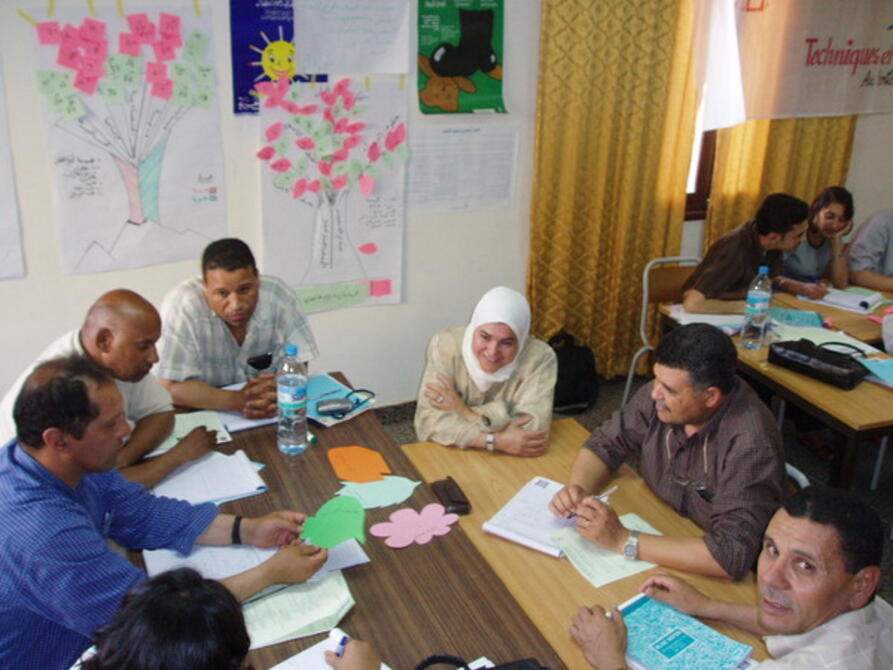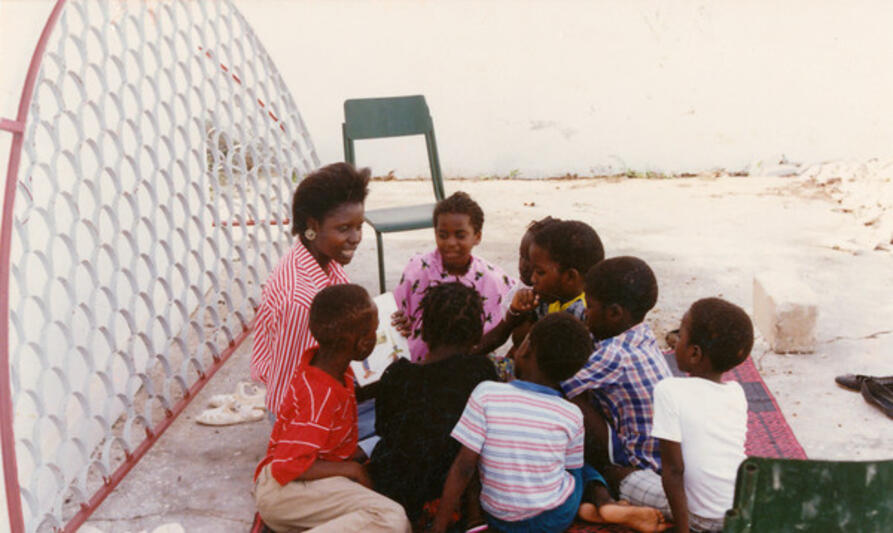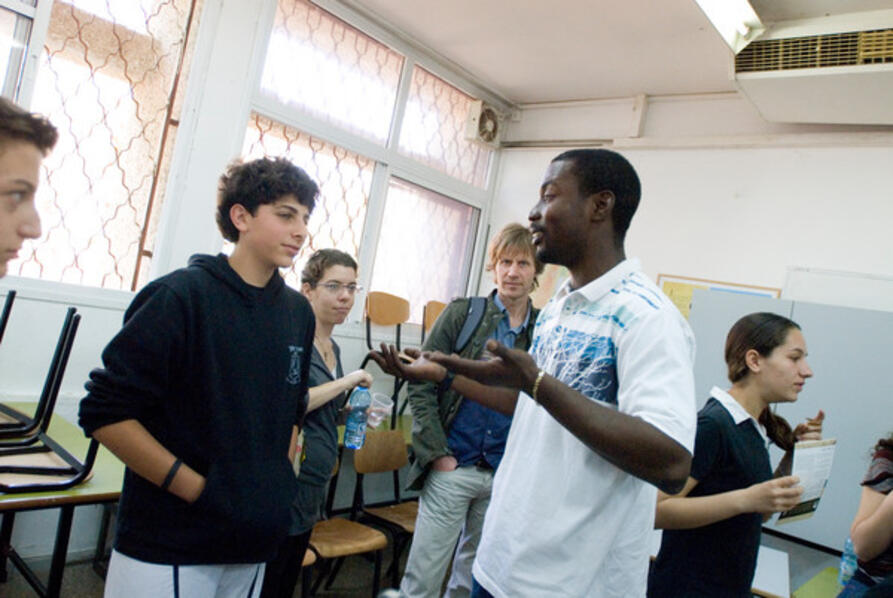
Background of The Centre
For more than two decades, Amnesty International Norway has worked on human rights education. Building on these experiences, the International Human Rights Education Centre will be a knowledge centre for human rights education globally.
Publisert:
17. nov 2011, kl. 14:06
|
Sist oppdatert:
20. des 2011, kl. 10:51
The establishment of the International Human Rights Education Centre (IHREC) is part of Amnesty International’s work to develop centres of special competence. Since 1990, Amnesty International’s section in Norway has played a central role in working with human rights education through planning and administrating two long term educational programmes from 1991 until 2009.
Through local Amnesty sections and structures, Amnesty International Norway has funded and developed human rights educations activities in all regions of the world in coordination with the International Secretariat in London.
To benefit from the experiences, resources and networks developed in Amnesty International Norway throughout the past 20 years, an international centre for human rights education was established in Oslo, in January 2011.
The IHREC is a resource centre that will contribute to Amnesty International's ongoing projects and programmes, and initiate new ones. The centre will contribute to the development of the organisation’s competence in the field of human rights education and make Norway a powerful centre for human rights education. The IHREC works together with the rest of the Amnesty movement to achieve human rights change through various forms of human rights education
Building awareness of human rights
Amnesty International Norway´s work for human rights education started in 1991 with the programme “Teaching for Freedom”. This programme was funded by the solidarity campaign of Norwegian students, the Operation a Day's Work (OD).
The money collected that year allowed the funding of different human rights education projects in 26 countries between 1991 and 1999. The overall purpose of the programme, was to build a general awareness of human rights, to prevent violations of human rights, to educate a new generation of human rights activists and to contribute towards a society where basic human rights are respected.
Read the final evaluation of Amnesty International's "Teaching For Freedom" Programme.
Making positive impact
Building on the successes and lessons learned from the “Teaching for Freedom” programme, Amnesty International Norway initiated a new project in 1999, called the Rights Education Action Programme (REAP). REAP was supported by the funds from the Norwegian National Broadcasting (NRK) Telethon, TV- aksjonen.
REAP was implemented by Amnesty International in ten different countries. After assessing local needs, REAP project partners selected specific human rights topics to work on, relevant to their target groups and to the human rights context of the country.
At the core of REAP was the training of human rights education “multipliers” – individuals who, through their roles or positions in society, are able to influence a larger audience or groups of people. These multipliers included teachers, journalists, youth and religious leaders.
Through REAP, project partners created positive human rights impact and contributed to Amnesty International’s aim to build a human rights culture worldwide.
Read the executive summary of REAP- evaluation here.
Creating pressure from below
“Teaching for Freedom” and REAP involved bilateral cooperation with more than 30 different local Amnesty organisations in all parts of the world, and had substantial impact.
The projects have concentrated in different ways to disseminate human rights, such as training of imams in women's rights in Turkey, human rights education for prison officers in Morocco, courses for schools in Moldova and the establishment of human rights clubs in Poland.
"In human rights work we must engage people to grasp the human rights challenges in their own country. This is why human rights education is so important. People must have knowledge of their rights to demand changes." (Vibeke Eikås, head of both the Teaching for Freedom” and REAP programmes.)
Read the Lessons learned from the Rights Education Action Programme:
Human Rights Education in Formal Education
Human Rights Education in Non - Formal Settings
Human Rights Education Engaging New Target Groups
The Multiplier Approach In Human Rights Education
An external evaluation was initiated at the end of the Rights-Education-Action Programme - REAP. The evaluation was done by Ms Felisa Tibbitts of Human Rights Education Associates, USA.
Here is an executive summary of the evaluation report, showing the impact the projects have had on differrent levels in the countries where they were carried out; from the individual beneficiaries who were sensitised, capacitated and mobilised into human rights activities, to the top national level, where the project had an impact on national legislation and reform.
Here is the full evaluation report, which also gives graphic presentations of the specific findings of impact according to a number of different variables, e.g. country, gender, awareness, knowledge, skills, etc.



Through local Amnesty sections and structures, Amnesty International Norway has funded and developed human rights educations activities in all regions of the world in coordination with the International Secretariat in London.
To benefit from the experiences, resources and networks developed in Amnesty International Norway throughout the past 20 years, an international centre for human rights education was established in Oslo, in January 2011.
The IHREC is a resource centre that will contribute to Amnesty International's ongoing projects and programmes, and initiate new ones. The centre will contribute to the development of the organisation’s competence in the field of human rights education and make Norway a powerful centre for human rights education. The IHREC works together with the rest of the Amnesty movement to achieve human rights change through various forms of human rights education
Building awareness of human rights
Amnesty International Norway´s work for human rights education started in 1991 with the programme “Teaching for Freedom”. This programme was funded by the solidarity campaign of Norwegian students, the Operation a Day's Work (OD).
The money collected that year allowed the funding of different human rights education projects in 26 countries between 1991 and 1999. The overall purpose of the programme, was to build a general awareness of human rights, to prevent violations of human rights, to educate a new generation of human rights activists and to contribute towards a society where basic human rights are respected.
Read the final evaluation of Amnesty International's "Teaching For Freedom" Programme.
Making positive impact
Building on the successes and lessons learned from the “Teaching for Freedom” programme, Amnesty International Norway initiated a new project in 1999, called the Rights Education Action Programme (REAP). REAP was supported by the funds from the Norwegian National Broadcasting (NRK) Telethon, TV- aksjonen.
REAP was implemented by Amnesty International in ten different countries. After assessing local needs, REAP project partners selected specific human rights topics to work on, relevant to their target groups and to the human rights context of the country.
At the core of REAP was the training of human rights education “multipliers” – individuals who, through their roles or positions in society, are able to influence a larger audience or groups of people. These multipliers included teachers, journalists, youth and religious leaders.
Through REAP, project partners created positive human rights impact and contributed to Amnesty International’s aim to build a human rights culture worldwide.
Read the executive summary of REAP- evaluation here.
Creating pressure from below
“Teaching for Freedom” and REAP involved bilateral cooperation with more than 30 different local Amnesty organisations in all parts of the world, and had substantial impact.
The projects have concentrated in different ways to disseminate human rights, such as training of imams in women's rights in Turkey, human rights education for prison officers in Morocco, courses for schools in Moldova and the establishment of human rights clubs in Poland.
"In human rights work we must engage people to grasp the human rights challenges in their own country. This is why human rights education is so important. People must have knowledge of their rights to demand changes." (Vibeke Eikås, head of both the Teaching for Freedom” and REAP programmes.)
Read the Lessons learned from the Rights Education Action Programme:
Human Rights Education in Formal Education
Human Rights Education in Non - Formal Settings
Human Rights Education Engaging New Target Groups
The Multiplier Approach In Human Rights Education
An external evaluation was initiated at the end of the Rights-Education-Action Programme - REAP. The evaluation was done by Ms Felisa Tibbitts of Human Rights Education Associates, USA.
Here is an executive summary of the evaluation report, showing the impact the projects have had on differrent levels in the countries where they were carried out; from the individual beneficiaries who were sensitised, capacitated and mobilised into human rights activities, to the top national level, where the project had an impact on national legislation and reform.
Here is the full evaluation report, which also gives graphic presentations of the specific findings of impact according to a number of different variables, e.g. country, gender, awareness, knowledge, skills, etc.



